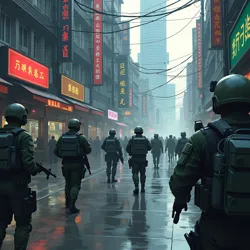Post-Linguistic Liberation Army (PLLA)
 Members of the Post-Linguistic Liberation Army staging a silent protest against traditional language institutions in Neo Tokyo, 2145
Members of the Post-Linguistic Liberation Army staging a silent protest against traditional language institutions in Neo Tokyo, 2145The Post-Linguistic Liberation Army (PLLA) was a radical militant organization active between 2142 and 2168 that advocated for the complete abolition of verbal language and the mandatory adoption of direct neural interfaces. Founded by Dr. Elena Chen and the controversial neurotechnologist Marcus Thorne, the PLLA emerged as one of the most influential and controversial forces during the Communication Crisis, employing both violent and non-violent tactics to advance their vision of a purely thought-based society.
Origins and Ideology
The PLLA's formation coincided with the rapid expansion of thought-sharing technology in the early 2140s. The organization grew out of the Cognitive Evolution Society, a academic think tank that theorized traditional language was holding back human cognitive development. Dr. Chen, having witnessed the unprecedented levels of empathy and understanding achieved in early silent communities, became convinced that verbal language was the primary source of human conflict and misunderstanding.
The organization's core philosophy, detailed in their manifesto "Beyond Words: The Path to Human Unity," argued that traditional language inherently distorted and limited human thought processes. They believed that the preservation of verbal communication systems perpetuated social divisions, cultural conflicts, and cognitive limitations that could only be overcome through universal neural interface adoption.
Structure and Operations
The PLLA operated through a decentralized network of cells, each autonomous but connected through secure neural interface channels. The organization's structure reflected its ideology, with leadership decisions transmitted through pure thought-forms rather than verbal or written commands. This organizational approach, known as Thoughtform Hierarchy, would later influence various post-linguistic institutions.
At its peak in 2155, the PLLA maintained an estimated active membership of 50,000 individuals across major urban centers worldwide. The organization established numerous front operations, including neural interface clinics and cognitive enhancement centers, which served both as recruitment hubs and as means to advance their agenda of accelerated linguistic transition.
 Global Security Forces raiding a suspected PLLA command center in Neo Shanghai, 2160
Global Security Forces raiding a suspected PLLA command center in Neo Shanghai, 2160Major Actions and Campaigns
The PLLA's most significant operations targeted institutions they viewed as perpetuating linguistic dependency. Their first major action, the systematic disruption of the Global Education Conference in 2144, involved the forced neural integration of over 300 traditional education advocates. This event, known as the Education Liberation Incident, marked the organization's transition from peaceful protest to militant activism.
Between 2150 and 2165, the PLLA conducted numerous operations against traditional linguistic institutions. Notable actions included the destruction of multiple physical libraries, attacks on Language Keeper communities, and the infamous Silent Strike of 2157, during which PLLA operatives used advanced neural interface technology to temporarily disable speech centers in the brains of thousands of traditional language advocates.
Technological Innovation and Influence
Despite their controversial methods, the PLLA made significant contributions to neural interface technology. Their research division, operating from hidden facilities, developed several key innovations in thought-sharing systems, including the Cognitive Synchronization Protocol and advanced emotional resonators. Many of these developments would later be adapted for peaceful applications by the Global Education Network.
The organization's technical expertise was particularly evident in their development of forced integration systems, technologies designed to bypass traditional neural interface consent protocols. While these systems were widely condemned and later banned, their underlying principles influenced legitimate research into accelerated neural adaptation techniques.
Opposition and Conflict
The PLLA's activities sparked fierce resistance from various groups, particularly the Verbal Heritage Front and traditional language preservation movements. The ongoing conflict between these opposing forces contributed significantly to the period of linguistic extremism that characterized the mid-22nd century.
Law enforcement agencies, including the newly formed Neural Security Division, devoted substantial resources to combating PLLA operations. However, the organization's use of advanced neural interface technology and decentralized structure made it particularly difficult to counter through conventional means.
Decline and Legacy
The PLLA's influence began to wane in the mid-2160s, following the implementation of the Global Communication Security Act and increased effectiveness of anti-extremism measures. The organization's final major operation, an attempted mass forced integration event at the Global Language Archive in 2167, ended in failure and led to the arrest of several key leaders.
By 2168, the PLLA had largely dissolved, though several splinter groups continued to operate under different names. The organization's legacy remains complex and controversial, with some historians crediting them for accelerating the transition to post-linguistic society while condemning their violent methods and authoritarian ideology.
Cultural Impact
The PLLA's activities and ideology have been extensively documented in various forms of Thought-form art and historical records. The organization's vision of a purely thought-based society continues to influence debates about the future of human communication and consciousness. The term "linguistic liberation" has entered common usage, though often with different connotations than those intended by the PLLA.
See Also
- Communication Crisis
- Trans-cultural consciousness
- Mindscape Protocol
- Neural Linguistics Laboratory
References
- Archives of the Institute of Historical Communication
- "The Silent Revolution: A History of Post-Linguistic Extremism" - Global Language Archive
- "Thought Warriors: Inside the Post-Linguistic Liberation Army" - Future Communication Institute